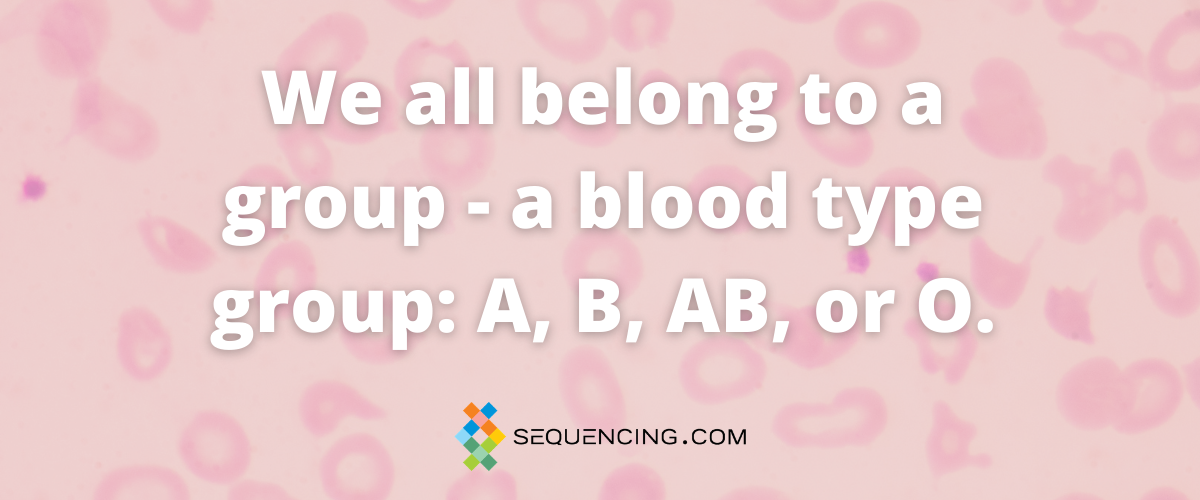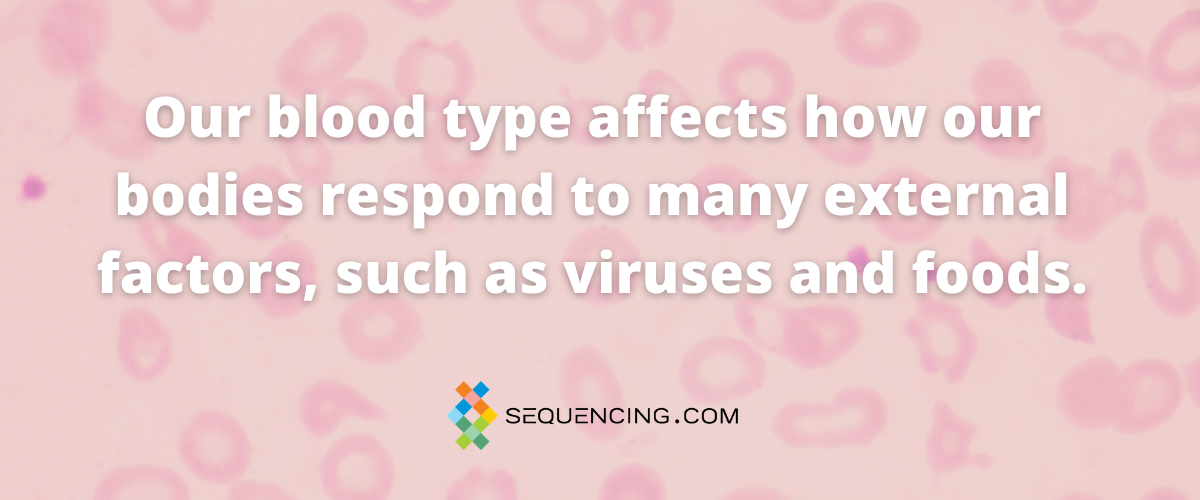By Dr. Brandon Colby MD, a medical expert specializing in precision medicine.
The Link Between Blood Type and COVID
Is there a connection between coronavirus risk, COVID-19 severity, and blood type? Many people would say no, but two new studies further support the growing body of scientific evidence that individuals with blood type O may have a lower risk of infection while those with blood type A or AB may have an increased risk of a more severe, life-threatening COVID-19 infection.
Do you know what your blood type is? In this article, we'll tell you how to find out your blood type for free.
What Is Blood Type?

Blood type is a classification of blood identified by antibodies and inherited antigenic substances. In other words, scientists many years ago identified that people have different types of blood running through their bodies. There are four main blood types:
- A
- B
- AB
- O
Knowing the type of blood people have can save their life. Blood transfusions from people with the same type can keep someone from dying. That’s not the only use for blood type, though.
Since blood is what transports what our bodies need to stay alive and function, it makes sense that researchers study how the different types influence our risks to viruses, such as the Coronavirus.
New Studies Suggest Lower Risk of Coronavirus for Blood Type O
A Danish study revealed that only 38.4% of 7,422 people who tested positive for Coronavirus were blood type O. Out of all people (2.2 million) never tested were blood type 0, which makes up 41.7% of the population.
This may not mean much but when you look at the group that tested positive - 44.4% - they were either blood type A or AB.
The Severity of Coronavirus and Blood Type
In addition to lower rates of contracting the virus, people with blood type A or AB suffered much more from the virus. Eighty-four percent of those with either of those blood types required mechanical ventilation - only 61% of those with O or B required it.
A Canadian study also found people with type A or AB blood had to stay in the intensive care unit longer than those with O or B - 13.5 days vs. 9 days.
Dr. Mypinder Sekhon, clinical assistant professor in the Division of Critical Care Medicine and Department of Medicine at the University of British Columbia, points out that blood type O individuals are less prone to coagulation problems in the blood. Clotting has been a huge factor in the severity of COVID-19, which strengthens the evidence between coronavirus and blood type.
Ethnicity and Blood Types - Coronavirus Risk
Blood type is 100% determined by a person's genes. Since many countries have a larger proportion of people with one or two blood types, the reason why some countries may be fairing better than others with the worldwide pandemic may be related to blood type! The Danish study found that nearly half of their population has A blood type. They have suffered greatly during the pandemic like much of the world.
In the United States, the majority of the population has either O or A blood types. While we can’t say for a fact that if the United States’ population was comprised of mostly O blood types that the virus wouldn’t have run as rampant as it has, but that’s what the studies are implying.
What Else Our Blood Type Tells Us About Ourselves
Coronavirus and blood type aren’t the only associations we can make; blood type also influences our risk for many medical conditions:
-
Blood type A individuals have a 20% higher chance of suffering from stomach cancer and a 5% increased risk of heart disease.
-
Blood type B individuals have an 11% increased risk of heart disease compared to type O individuals. B women have a higher chance of suffering from ovarian cancer.
-
AB blood type individuals are at increased risk of heart disease as well and pregnant women are more likely to develop preeclampsia.
-
People with type O have a low risk of pancreatic cancer, low risk of dying from malaria, and are more likely to suffer from ulcers.
Since blood type has so much to do with the immune system and medical conditions, it makes sense that there has been some evidence that a blood type diet may be effective in weight management.
People with blood type A often have sensitive immune systems (another reason they are more susceptible to coronavirus and other medical conditions). The blood type diet suggests these people stay away from meat, and concentrate on fruits and vegetables.
Blood type B people should avoid chicken and base their diet on green vegetables, eggs, pork, beef, and low-fat dairy products.
Type AB individuals should avoid caffeine, alcohol, and smoked/cured meats. These individuals often have low stomach acid, so they would do best with tofu, seafood, dairy, and green vegetables.
Do Your Genes Impact Your COVID Risk?
Dr. Brandon Colby, a medical physician that specializes in DNA testing and personalized preventive medicine, provides a great review of the scientific research on a person's DNA and their risk from COVID-19. Dr. Colby discovered many useful studies that have already pinpointed specific genes that partly determine whether a person is likely to have a more severe COVID-19 infection.
It turns out that both the likelihood of becoming infected by coronavirus and the likelihood of having an infection becoming severe and life-threatening are determined by a person's genes. The genes responsible go beyond the gene that determines your blood type and includes several important immune system genes. Using this information, an analysis of a person's genetic risk from COVID-19 is now possible.
Find Out Your Blood Type For Free
Knowing your blood type will help you take care of your body better, including taking the necessary precautions to reduce the risk of medical conditions and other undesirable outcomes associated with the blood type. Since most people do not know what their blood type is, Sequencing.com has made it possible for them to find out with their free ABO Blood Type analysis.
How Your DNA Can Help Protect Your Health
Those who have already had a DNA test by 23andMe, AncestryDNA, MyHeritage, and Dante Labs can upload their raw DNA data easily to Sequencing.com's secure and confidential account. Sequencing's Privacy First commitment ensures your data remains private. We never sell or share your data, including your DNA data, with anyone.
For those who have not yet taken a DNA test and don’t have raw DNA to upload, you can purchase a DNA test kit online. Once the DNA test has completed, your DNA data will be stored in your confidential Sequencing.com account and ready to use with the free ABO Blood Type app analysis app or another report from the wide assortment available from Sequencing.com.
23andMe Blood Type
If you've taken 23andMe's DNA test, you can use your raw genetic data to determine your blood type for free. While 23andMe doesn't provide a blood type report, Sequencing.com does for free, and it works with 23andMe data.
Simply import your DNA data from 23andMe into your Sequencing.com account by clicking the '23andMe Compatible' button and then use the free ABO Blood Type DNA analysis app to obtain your blood type. If you've already downloaded your 23andMe data file, you can also use that same link to upload your file from your computer.
Blood type analysis is just one of many free DNA reports. Another free report is the Coronavirus DNA Health Assessment, which analyzes DNA test data from 23andMe and most other test providers, and provides insights about each person's genetic risk from COVID-19. This is very helpful because differences in our genes explain why some are severely impacted by COVID while others are hardly impacted and may not even have any symptoms.
23andMe also performs its own research using customer's DNA data. A recent 23andMe study corroborated several other independent studies that all found that a person's blood type is associated with whether the person is more or less likely to have a severe COVID-19 infection.
AncestryDNA Blood Type
The free blood type analysis works with data from almost all DNA tests including those from AncestryDNA, MyHeritage, Family Tree DNA, and Living DNA. To get started, import your DNA data into your Sequencing.com account and then find the blood type analysis app in our DNA App Store (hint: it's located in the 'Free' category with a bunch of other free DNA reports).
Confidential Blood Type Analysis
Sequencing's Privacy First policy makes it clear that your data is not sold or shared with anyone, that you own your data, and you can access, download and permanently delete it at any time, for any reason, and for free. If Sequencing.com is offering free DNA analysis and it's not selling your data, you may be wondering about its business model.
Sequencing is the world's largest DNA App Store. While many DNA analysis apps and reports are free, there are also more than 100 additional apps and reports that cost money to use. Sequencing.com also offers DNA tests and whole genome sequencing services.
About The Author
Dr. Brandon Colby MD is a US physician specializing in the personalized prevention of disease through the use of genomic technologies. He's an expert in genetic testing, genetic analysis, and precision medicine. Dr. Colby is also the Founder of Sequencing.com and the author of Outsmart Your Genes.
Dr. Colby holds a degree in genetics from the University of Michigan, an MD from Mount Sinai Medical School in New York City, and an MBA from Stanford University's Graduate School of Business.
Scientific References
"Reduced prevalence of SARS-CoV-2 infection in ABO blood group O" by Mike Bogetofte Barnkob, et al., 14 October 2020, Blood Advances. DOI: 10.1182/bloodadvances.2020002657.
"The association of ABO blood group with indices of disease severity and multiorgan dysfunction in COVID-19" by Ryan L. Hoiland, et al., 14 October 2020, Blood Advances. DOI: 10.1182/bloodadvances.2020002623.
"Genomewide Association Study of Severe Covid-19 with Respiratory Failure" by The Severe Covid-19 GWAS Group, 15 October 2020, New England Journal of Medicine. DOI: 10.1056/NEJMoa2020283.
"Genetic mechanisms of critical illness in Covid-19" by Pairo-Castineira, E., 23andMe, et al. 11 December 2020, Nature. DOI: 10.1038/s41586-020-03065-y.


